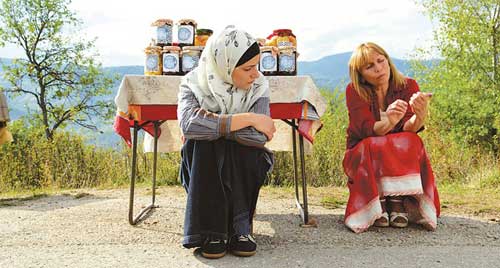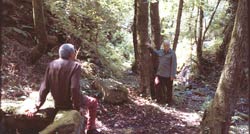
In an earlier post, I wrote that I wasn’t going to discuss all the films that aren’t here at Toronto, but most critics agree that this year’s lineup is unusually thin. At least when it comes to big-name directors, whether that be Hollywood prestige types like Clint Eastwood or hardcore cinephile such as Lucretia Martel. Some have blamed it on the writer’s strike, others point to the lack of quality films at Cannes and especially Venice. Of course, one doesn’t preclude the other.
That lack of high-profile films can be seen in my choices for today. While I’m excited to see both the Coen brothers and the Wavelengths program of Nathaniel Dorsky and Jean-Marie Straub, my other three films are selections I probably wouldn’t have made in previous years; they would’ve been superceded by something more interesting. Of course, that doesn’t mean they’ll necessarily be bad, and there are few things more exciting than discovering gold where you expected bronze. Would I strike gold today?
The first film, Snow, is certainly worthwhile. Set in Bosnia in 1997, just after the end of the war, it focuses on a small village of women; the men have mostly been murdered during the war. The women sit around at night imitating various family and friends who’ve been lost--hoping to keep alive their memories--while during the day they can various fruits and vegetables that they hope to sell. One week, two different outsiders enter the picture, both of whom might help end their financial difficulties. But can either be trusted?
The movie revolves around Alma, a young widow who’d like to “feed half of Bosnia†with the village’s food. But where does that dream come from, and is it realistic? Director Aida Begic has a nice eye for color and composition, especially in the movie’s early stages as we get to know the women and their hilltop land. And with a day-by-day structure (both outsiders promise to return several days later), the narrative pushes towards a climax, as we wonder which outsider will prove dependable and which one the cad.
Like many post-war films, issues of memory and recovery are front and center, but Begic rarely loses track of the details of her characters’ lives. One particularly nice sequence involves Alma going through a music box that contains precious photos and a ring. Unfortunately, the ending is a bit much, involving a mute boy and his dreams, a long walk to a cave, and snow. By trying to pack in so many metaphors, Snow stumbles a bit. But only a bit. It’s not quite gold, but silvery snow.
The Sky Crawlers certainly aims high, as Japanime director Mamoru Oshii (Ghost in the Shell) focuses on a war in the future, when federations of countries hire huge multi-national companies to fight against each other. The main characters are a squadron of fighter pilots, who also happen to be Kildren. Explaining what these are would rob you of one of the few interesting parts of the narrative, so I won’t.
The film isn’t horrible, but too often Oshii delays providing information that a thoughtful audience can already guess at, so the story crawls along with little suspense or intrigue. The animation is impressive, especially in the few airplane dogfights, but the melancholy characters never resonate and the war ruminations are standard-issue (what a spectacle war is! civilians have no idea what soldiers go through!). Only a parallel with Blade Runner proves interesting, but that unfortunately rises long after my interest had already fallen.
But even that’s better than the Coen brothers' latest, Burn after Reading. First, you should know that the movie, despite what you might think from the trailer, is not a comedy. And I don’t mean that it’s not funny, which it’s not. I mean that it’s not trying to be funny, at least not very often. Instead, it’s a somewhat standard (and by that I mean, convoluted) spy plot, except that every character is incredibly stupid. And irritating. I suspect the only reason they don’t speak in ridiculous accents is because the brothers Coen have already abused every American accent possible. Still, the whole thing is relatively watchable, with Brad Pitt, George Clooney, and Frances McDormand giving it their best. Too bad that doesn’t even come close to capturing a bronze.
The final film of the day is a Chinese drama called Knitting. Variety would call it a three-hander, meaning that it focuses exclusively on three characters. In this case, that’s a young man, his younger girlfriend, and an old flame who invites herself into the couple’s life. All three are “northerners†come south to make their fortune. No surprise that that’s harder than they thought. Still, they’re game for anything, including running a van service, wholesaling counterfeit vinegar, and selling fish on the streets.
The socio-economic aspects of the film are the most compelling, but it unfortunately focuses more on the inter-personal affairs. This means the two women are constantly bickering, while the man tries to make peace. While I’m a fan of oblique stories, the fact that we have no idea why the old flame has returned or what her back story is makes the drama unsatisfying and the narrative shifts relatively arbitrary. But even that would be ok if we cared about any of these three. But the one woman is too brassy while the other is too immature, and the man never achieves any kind of depth. Like The Sky Crawlers, this isn’t horrible, but it’s hardly satisfying.
That’s not much of a day: one solid film and three mediocre. But what’s that you say, careful reader? Didn’t I mention I had five movies on Day 2? Why yes I did, and the one I’ve skipped redeems the rest.
I haven’t been to a Wavelengths program in a few years, but I’ve selected three different ones this festival. The first featured two short films by San Francisco artist Nathaniel Dorsky and the latest film from Jean-Marie Straub. The Straub is beautiful but difficult, particularly since I’ve never seen any of his work before. This one involves two men standing in a beautiful forest clearing, talking to each other. One apparently is the mythic Endymion, while the other is a god. But the print I saw made following the copious subtitles difficult, so I gave up on reading their dialogue and focused on the gorgeous filtered sunlight landing on the scene. That was pleasure enough.
But the highlight of the program and the day were the Dorsky films. Winter (22 min.) and Sarabande (15 min.) were the first movies I had seen by him, but now I want to catch up with all his work. The movies are challenging to describe, as Dorsky intentionally avoids settling into standard tropes, even by experimental standards. Rather, his movies are about light and shadow and color. He achieves this by often filming through layers of material. In Winter, that involves often being inside a car filming out or outside filming in. But Dorsky also plays with his focus, so that the compositions are rarely defined.
It took me about halfway through Winter to realize that it was counter-productive to try to figure out what I was seeing. Instead, I needed to just enjoy the play of light and shadow. Once I made that transition, I fell in love with what Dorsky is doing. One particularly spectacular shot features beads of rain on a car hood that also reflect a moonlit sky. By altering the focal length, Dorsky completely changes the dynamic of what we're seeing. I almost gasped out loud.
What I finally started to understand is that his films are the opposite of our normal vision. In life, our eyes attempt to detect patterns, to recognize forms, to understand. Dorsky frustrates that in his films by shooting through things and leaving the frame out of focus, so that we can only experience instead of grasp. In that way, we appreciate the beauty of the world in ways we never normally would. As with most great avant-garde cinema, the movies alter our perception and send us out into the world ready to see it anew. Golden, indeed.
Tomorrow, TIFF returns to form with one amazing film and two very good ones.








J. Robert, the Discovery Program is one of my favorites at Toronto and I find it important to factor in that these are the first narrative features of up-and-coming directors so they are often flawed, even if engaging. I liked Snow a lot, precisely for the pitched contrast of its magical realism with political realism. I caught a public screening so had the opportunity to hear her speak about the film. She was quite striking, in her traditional Muslim garb accented with festival sparkles. I wanted to ask her why the bad guy speaks English in the film; I thought that was an interesting choice.